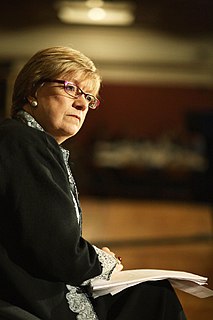A Quote by Brigham Young
Emma took the revelation, on polygamy supposed she had all there was; but Joseph had wisdom enough to take care of it, and he had handed the revelation to Bishop Whitney, and he wrote it all off... She went to the fireplace and put it in, and put a candle under it and burnt it, and she thought that was the end of it, and she will be damned as sure as she is a living woman. Joseph used to say that he would have her hereafter, if he had to go to hell for her, and he will have to go to hell for her as sure as he ever gets her.
Related Quotes
Before her marriage she had thought that she had love within her grasp; but since the happiness which she had expected this love to bring her hadn’t come, she supposed she must have been mistaken. And Emma tried to imagine just what was meant, in life, by the words “bliss,” “passion,” and “rapture” - words that had seemed so beautiful to her in books.
Tessa had begun to tremble. This is what she had always wanted someone to say. What she had always, in the darkest corner of her heart, wanted Will to say. Will, the boy who loved the same books she did, the same poetry she did, who made her laugh even when she was furious. And here he was standing in front of her, telling her he loved the words of her heart, the shape of her soul. Telling her something she had never imagined anyone would ever tell her. Telling her something she would never be told again, not in this way. And not by him. And it did not matter. "It's too late", she said.
At that moment a very good thing was happening to her. Four good things had happened to her, in fact, since she came to Misselthwaite Manor. She had felt as if she had understood a robin and that he had understood her; she had run in the wind until her blood had grown warm; she had been healthily hungry for the first time in her life; and she had found out what it was to be sorry for someone.
She didn’t understand why it was happening,” he said. “I had to tell her she would die. Her social worker said I had to tell her. I had to tell her she would die, so I told her she was going to heaven. She asked if I would be there, and I said that I would not, not yet. But eventually, she said, and I promised that yes, of course, very soon. And I told her that in the meantime we had great family up there that would take care of her. And she asked me when I would be there, and I told her soon. Twenty-two years ago.
She had been so wicked that in all her life she had done only one good deed-given an onion to a beggar. So she went to hell. As she lay in torment she saw the onion, lowered down from heaven by an angel. She caught hold of it. He began to pull her up. The other damned saw what was happening and caught hold of it too. She was indignant and cried, "Let go-it's my onion," and as soon as she said, "my onion," the stalk broke and she fell back into the flames.
Saint Teresa, as the Roman Rota attests, never fell into any mortal sin; but still Our Lord showed her the place prepared for her in Hell; not because she deserved Hell, but because, had she not risen from the state of lukewarmness in which she lived, she would in the end have lost the grace of God and been damned.
Now very much against her will, she thought of the way Jace had looked at her then, the blaze of faith in his eyes, his belief in her. He had always thought she was strong. He had showed it in everything he did, in every look and every touch. Simon had faith in her too, yet when he'd held her, it had been as if she were something fragile, something made of delicate glass. But Jace had held her with all the strength he had, never wondering if she could take it--he'd known she was as strong has he was.
Perhaps I will die too, she told herself, and the thought did not seem so terrible to her. If she flung herself from the window, she could put an end to her suffering, and in the years to come the singers would write songs of her grief. Her body would lie on the stones below, broken and innocent, shaming all those who had betrayed her. Sansa went so far as to cross the bedchamber and throw open the shutters ... but then her courage left her, and she ran back to her bed, sobbing.
I found her lying on her stomach, her hind legs stretched out straight, and her front feet folded back under her chest. She had laid her head on his grave. I saw the trail where she had dragged herself through the leaves. The way she lay there, I thought she was alive. I called her name. She made no movement. With the last ounce of strength in her body, she had dragged herself to the grave of Old Dan.
Yet there were times when he did love her with all the kindness she demanded, and how was she to know what were those times? Alone she raged against his cheerfulness and put herself at the mercy of her own love and longed to be free of it because it made her less than he and dependent on him. But how could she be free of chains she had put upon herself? Her soul was all tempest. The dreams she had once had of her life were dead. She was in prison in the house. And yet who was her jailer except herself?
You know, and the fact that Nina Simone had to start playing in clubs and sing because her parents had moved north to support her music education. You know, so she had to sing. She had to make a living 'cause she was supporting her family. So poverty and race put her in this place which, you know, created enormous success, but it's not what her psyche was all about.









































